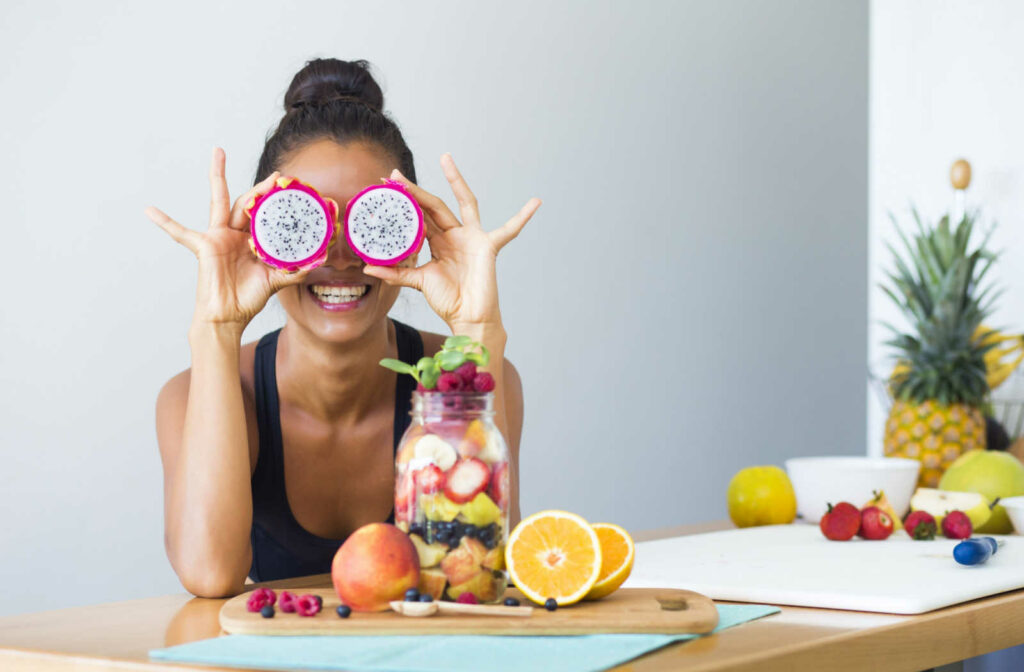Your eyes and vision are ever-changing, and maintaining your eye health can depend on various factors. The first step to consistent eye care is visiting your optometrist for consistent eye exams so they can monitor changes in your vision.
Another aspect of eye health is monitoring your diet. A well-balanced, healthy diet can make a huge difference in keeping your eyes healthy.
Let’s explore the top 10 foods for eye health and how you can incorporate them into your diet.
Exploring the Top 10 Foods for Eye Health
A balanced diet is essential to maintaining your overall health and an excellent way to help keep your eyes healthy. Your body needs a balanced dose of nutrients to perform its best, which also carries over to your vision.
Let’s explore some of the foods that can help preserve your eye health.
#1 Fish
Fish, particularly salmon, is an excellent source of healthy omega-3 fatty acids, which help promote eye health and carry vitamins throughout your body.
To spice up your meal, you can try seasoning fish with fresh herbs, lemons, salt and pepper to prepare a delicious dinner!
#2 Citrus Fruits
Citrus fruits such as lemons, oranges, and grapefruits are rich in vitamin C, which is an antioxidant that helps fight age-related eye damage.
Citrus fruits are easily accessible, and you should consider picking some up during your next grocery store run.
#3 Carrots
Carrots are an excellent source of vitamin A and beta carotene, which help the surface of the eye and can help against eye infections and other severe eye conditions.
Carrots are a simple snack you can take on the go and eat throughout the day or put in your favourite salad around dinner time.
#4 Dairy Products
Dairy items like milk and yogurt contain vitamin A and zinc. Vitamin A can help protect the cornea, while zinc carries vitamins from your liver to the eyes. Zinc is an important mineral that helps with night vision and helps cataract prevention.
Dairy is all around you, so incorporating it into your daily diet won’t be too difficult!
#5 Nuts & Legumes
Nuts are rich in omega-3 fatty acids as well as a high level of vitamin E, which helps protect your eyes from age-related damage.
Nuts and legumes that are beneficial for eye health include:
- Peanuts
- Lentils
- Brazil nuts
- Cashews
- Walnuts
#6 Seeds
Like nuts and legumes, seeds are another option to get your omega-3s and dose of vitamin E. Seeds that are high in omega-3 fatty acids include:
- Flax seeds
- Chia seeds
- Hemp seeds
#7 Leafy Green Vegetables
Your leafy greens are important! They are rich in both lutein and zeaxanthin, which are nutrients that help prevent serious eye conditions such as age-related macular degeneration and cataracts. Leafy greens are also an excellent source of vitamin C.
Some leafy greens you can incorporate into your diet include:
- Kale
- Spinach
- Collards
#8 Eggs
Egg yolks contain vitamin A, lutein, zeaxanthin, and zinc, which are all crucial to eye health. Vitamin A works to safeguard the cornea, and lutein and zeaxanthin lower the chance of developing serious eye conditions such as age-related macular degeneration and cataracts. Zinc contributes to the health of the retina.
This abundance of nutrients and vitamins makes eggs an excellent option to preserve your eye health.
#9 Beef
Beef is an excellent source of zinc which has been linked to better long-term eye health. Zinc can help manage age-related sight loss and macular degeneration.
Other meats such as chicken breast and pork loin also contain zinc but not to the same level as beef.
#10 Sweet Potatoes
You may want your fix of potatoes, so why not opt for sweet potatoes? Sweet potatoes are rich in beta carotene and a good vitamin E source.
Beta carotene can help with your night vision and your eyes’ ability to adjust to the darkness.
Your Eye Health Comes First
Incorporating a good balance of vitamins, minerals, and omega-3 fatty acids is an excellent way to boost your overall health and your eye health. Most of the foods that are good for your eye health are easily accessible and even delicious.
Book an appointment with your optometrist today to learn more about your eye health.




